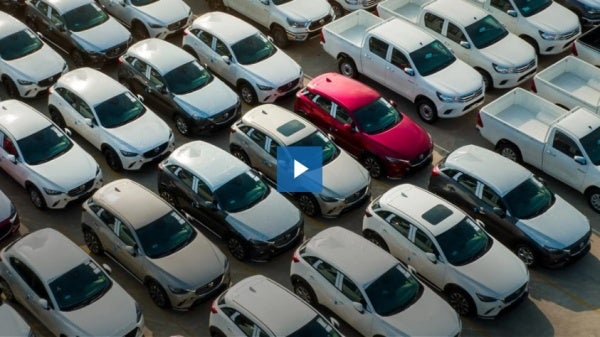Lire la version en français / Hier die deutsche Ausgabe lesen
Are you thinking about buying a new car? Read this first.
You may already be aware of the Chinese government’s crimes against humanity in the country’s northwestern region of Xinjiang. Among the many serious abuses against Uyghurs and other Turkic Muslim communities living there is forced labor.
There could be a rather direct line from this forced labor to the new car you’re looking at in the showroom. It comes via aluminum.
Aluminum is a key element in the manufacture of cars. The metal and its alloys are used in dozens of automotive parts, from engine blocks and vehicle frames to wheels and components of electric batteries. These parts are found in cars made in China, and they’re also exported to carmakers globally.
The source of this aluminum can be problematic.
Xinjiang’s aluminum production has grown massively in recent years. It’s now about nine percent of global supply. Most of Xinjiang’s aluminum is shipped out of the region and mixed with other metals to make aluminum alloys in other parts of China, including for the car industry.
The problem is, once an aluminum ingot has been melted and mixed with other materials, it is impossible to determine whether, or how much of it, came from Xinjiang. This is how aluminum tainted by forced labor enters domestic and global supply chains.
Like many industries in Xinjiang, aluminum producers are participating in Chinese government-backed labor transfer programs. That’s the forced labor system that coerces Uyghurs and other Turkic Muslims into jobs in Xinjiang and other regions.
If you’re someone about to buy a new car, you would surely like to avoid being tied up in all this.
Unfortunately, global carmakers usually can’t tell you if their cars are built partly on forced labor from Xinjiang aluminum or not. The fact is, car companies often simply don’t know where it’s coming from.
More specifically, they too often don’t ask.
A new report details how major car companies – like General Motors, Tesla, BYD, Toyota, and Volkswagen – are failing to minimize the risk of forced labor being used in their aluminum supply chains.
Now, some may argue that, given the extreme level of repression and surveillance in Xinjiang, it’s impossible for companies to properly investigate allegations of forced labor there. Workers and other potential whistleblowers live under constant fear and threat. Of course, that’s true.
But businesses shouldn’t just resign themselves to the situation. They should instead map their supply chains and drop any supplier found to source parts or materials from Xinjiang. In short: they should assume anything aluminum coming from Xinjiang could be tainted by forced labor.
So, what should the potential car buyer do?
As with many issues involving human rights abuses and the products we buy, this is not really a problem that’s going to get solved on the level of individual consumers choices. It will take action by governments to pay more attention to companies’ respect for human rights in China.
The good news is, we’re seeing some places make a start. Several jurisdictions, including the United States and the European Union, have enacted, or are planning laws banning imports of products linked to forced labor. Governments should also pass laws requiring companies to disclose supply chains and identify potential links to human rights abuses.
If you want to know what you, as an individual, can do, it’s clear: support such government measures.
It’s fine to be a concerned consumer and think about the choices you make, but being an engaged voter may ultimately have more impact.
For more on this subject, tune in to our LinkedIn audio event today, 16h00 CET, 10am EST.







